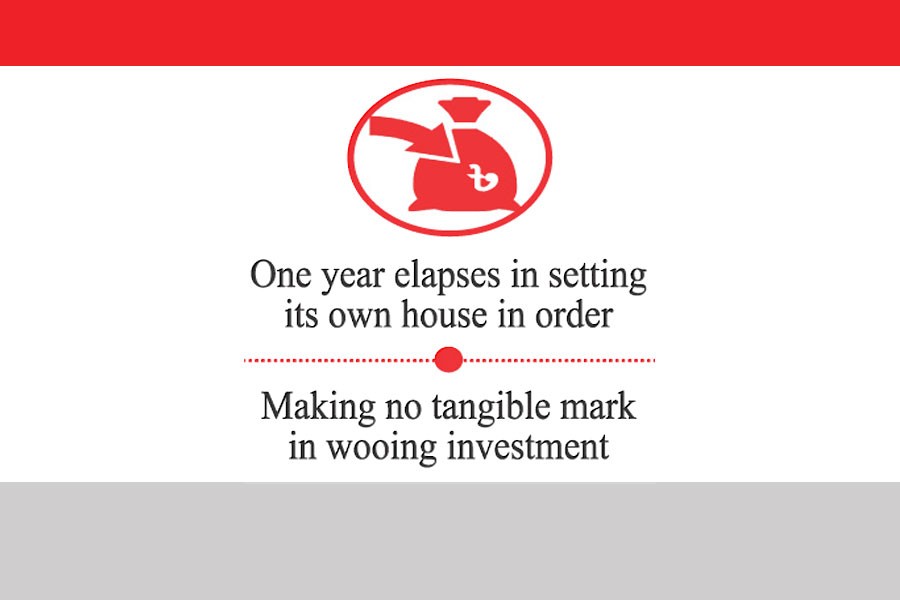
Published :
Updated :

The birth of BIDA hardly bears fruits yet as the authority is still engrossed in setting its own house in order with policy reforms and bringing coordination among stakeholders.
Sources close to the Bangladesh Investment Development Authority or BIDA agreed on this observation, but attributed the sloth to some gestation factors.
As a result, the main objectives of merger of two entities -- the Board of investment (BoI) and the Privatisation Commission (PC) -- into this integrated new outfit remained a distant dream even after the lapse of one year.
The Authority was formed aiming to boost investment in the country and effectively deal with the privatisation process.
The government formed the Authority on September 1, 2016 as per the Bangladesh Investment Development Authority Act 2016 passed in parliament in July in the past year.
Although BIDA's objective was to facilitate investment through One Stop Service (OSS), it is yet to launch that full-fledged service for investors due to absence of a relevant act.
The BIDA is empowered to privatise loss-incurring state-owned enterprises (SOEs) worth up to Tk 1.0 billion on its own initiative.
But, the sources said, it couldn't take any initiative so far to offload any of the entities in the last one year.
Touhidur Rahman, director of BIDA, said policy reform is a priority of the authority to improve the country's doing-business indicators in World Bank report.
A total of 110 reforms to introduce one-stop service will be required to improve the country's doing-business status in World Bank rankings, he added.
Amendment to the companies act is also a prerequisite for removing bottlenecks affecting investment, he said.
"Coordination of different entities including Registrar of Joint Stock Companies and Firms and power-supply board can expedite the process of policy reforms and time for obtaining services," he added.
BIDA has set a target to improve some of the country's doing-business indicators by May 2018, he said.
The authority has set some agenda for the next meeting of BIDA governing body, scheduled for November 19, focusing on ease of doing business, OSS and short-term strategic plan of the authority, he informed.
"We have a plan to improve country's position to 99th from 176th by 2020. BIDA wants to upgrade country's position at least 20 positions every year," he said.
In the latest WB doing-business report, Bangladesh ranked 176th out of 189 economies across the world.
The ease-of-doing-business report is based on 10 parameters, such as, starting a business, dealing with construction permits, getting electricity, registering property, getting credits, protecting minority investors, paying taxes, trading across borders, enforcing contracts and resolving insolvency.
During the last one year of its existence, BIDA-received Foreign Direct Investment (FDI) rose to US$ 2.9 billion from $2.2 billion and local investment proposals to $13.5 billion from $ 10 billion.
Investment proposals under Bangladesh Export Processing Zones Authority (BEPZA), Bangladesh Economic Zones Authority (BEZA), private EPZ, Bangladesh Small and Cottage Industries Corporation (BSCIC), and hi-tech parks will remain outside BIDA's purview.
Mr Rahman said a number of investment proposals are underway, including automobile, agro-machinery, plastic waste, active pharmaceutical ingredients (API) etc.
BIDA is moving ahead with a plan to establish economic corridors with all facilitates including medical facility, residences of labourers along with other industrial facility, he added.
The Asian Development Bank (ADB) has provided technical support and carried out a survey on economic corridor, he said.
"Corridors will be different from Economic Zones on which BEZA is working now. But, economic corridors will be managed by BEZA," he added.
Talking to the FE, executive director of Policy Research Institute (PRI) Dr Ahsan H Mansur said coordination among other ministries and departments is required to see visible success of BIDA.
"Economic zones can be set up in economic corridors. Both the authorities can work together," he said.
BIDA's agenda should be pushed forward by the highest level of the government to implement it successfully, Dr Mansur suggested.
Until OSS takes a final shape, the BIDA authorities can sign Memorandum of Understanding (MoU) with the other ministries to work together on investment promotion, he added.
Currently, BIDA is housed in an under-construction building in city's Agargaon. The place is not an investor-friendly one without having any desk of reception to attend investors.
The government formed BIDA as both PC and BOI failed to perform up to expectation.
In 1993, the Privatisation Board was formed for privatising the public-sector losing enterprises and later in 2000 it was turned into a commission.
The BoI was formed in 1999 to attract local and foreign investment, to little avail though.
doulot_akter@yahoo.com


 For all latest news, follow The Financial Express Google News channel.
For all latest news, follow The Financial Express Google News channel.